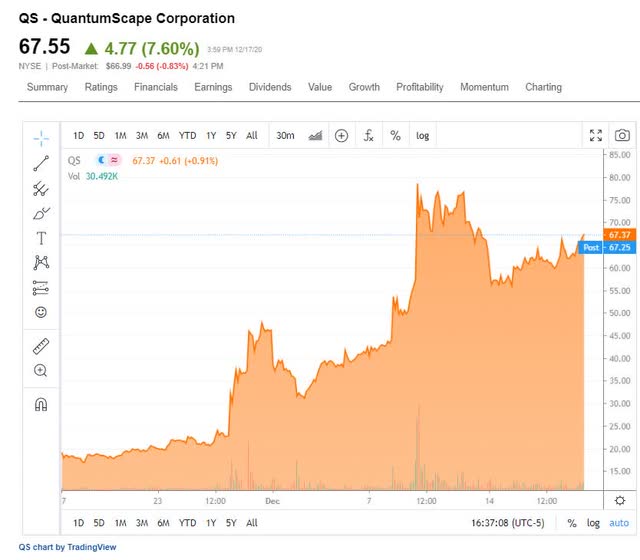Following the recent announcement by QuantumScape (NYSE:QS) that it discovered the purportedly most advanced all-solid state lithium metal battery of all time, there has been a considerable hype about this company. Incidentally, though, it has experienced a huge drop in the last few days, followed only by a partial recovery (See Figure 1). I am wondering now whether that fall may have anything to do with what I am just about to comment in this contribution.
Figure 1
Source: Seeking Alpha.
The company has argued that its battery is “anode-free.” What does that mean? According to a new state-of-the-art review of lithium metal batteries, it implies that, “the formation of a lithium metal anode occurs 'in situ using the cathode as the only source of lithium while charging."
Actually, as a recent comprehensive examination of anode-free batteries clarifies, these batteries “only consist of cathode current collector/cathode/separator/anode current collector, and electrolyte.”
The next question is, of course, how is then lithium metal formed 'in situ'? And, the answer is “the lithium on anode current collector is obtained from lithium-rich cathode (like LiFePO4, LiCoO2, LiNi1/3Mn1/3Co1/3 (NMC111), etc.). Specifically, lithium ions extracted from cathode (e.g. LiFePO4) through electrolyte /separator are electroplated onto anode current collector surface, forming a temporal anode and an electrochemically … solid electrolyte interphase (SEI)” in the initial charge cycle. The deposited lithium then becomes the only lithium source for discharge, which essentially means that, “after the initial charge process, the anode-free operates as lithium metal battery…” Thus, in principle, we could use any cathode to form the temporal anode. That being the case, we might utilize either lithium carbonate or lithium hydroxide to produce the necessary cathode material for anode-free lithium metal batteries.
Nevertheless, as the above-mentioned review of lithium metal batteries suggests, anode-free batteries, coupled with high-voltage cathode material, would expedite the
